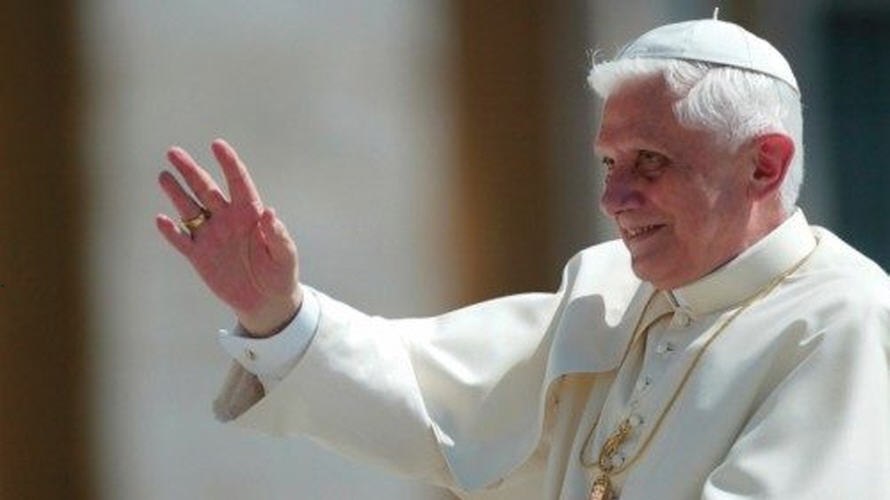|
Benedict XVI –
To enlarge the image ►
To click
Joseph Ratzinger – Benedict XVI, 96th anniversary of his birth
The Total Theologian
April 16, 2023 –
ESM – Readers of Hans Urs von Balthasar will not miss the allusion to the essay “Theology and holiness” in the title chosen for this memory of Benedict XVI on the occasion of the 96th anniversary of his birth, which falls today, Sunday April 16. Balthasar underlined how much the Fathers of the Church were in particular
total personalities in the sense that there was strict consistency native and nave between their teaching and their life and that they were far fromalism between dogmatics and spirituality, typical of the later period . I do not think it is exaggerating to say that Joseph Ratzinger is one of those rare theologians who knew how to combine in their thought the finesse of analysis and the depth of synthesis. A multi-faceted theologian, his works show his attention to the most intertwined questions of dogmatics, but also to pastoral themes…
GOOD
that he
either
A
academician
of
first
plan, he knew how to talk about theology to “non-initiates”. Her first bestseller Introduction to Christianity, but also the Jesus of Nazareth trilogy, written after his election to the papacy, bear witness to this gift. teaching given in Tbingen during the summer semester of 1967 to a mixed public from all faculties. Ratzinger responds to the successful attempt made before him by Karl Adam with the lecture on The Essence of Catholicism.
If I had to choose another adjective to define Ratzinger, I would use the adjective “Catholic“without hesitation. Not only in the confessional sense of the term (even if, let us remember, throughout the pontificate of John Paul II, he was the guardian of catholicity as prefect of the Congregation for the Doctrine of the Faith), but for style and elegance of his theological gesture.
This sensitive and dedicated man, a great musician, knew how to find and explain the chords and harmonies of faith..
He was Catholic in his attention to the complexity of reality and the eschatological and theological unity of Gestalt
overall things. Speaking of the eternal, he did not forget history. Listening to the data of faith, he also listened to the cries of culture expressed by its eminent representatives: philosophers, men of letters, artists…
He had the rare gift of perceiving and making people perceive the
concidentia oppositorum between elements that can sometimes seem – wrongly – irreconcilable: for example, mystical fidelity to Heaven and political fidelity to earth; to be theologian and to be a spiritual teacher; be deeply Catholic and at the same time open to other Christians and people of other religious (or non-religious) views.
It is with great sensitivity that the writings of Joseph Ratzinger convey the meaning of the integral figure of reality against the background of the Truth of God. In the fragmentation of our culture and our visions of the world, his thought can provoke us by its beauty, its clarity, its genius of interconnections and its gaze always fixed on Jesus the God-man and on the man in God, he has been able to indicate, with a look from below, the aspiration to meaning (and to the Ultimate Meaning) of every human being: man – he wrote – does not live only on the bread of feasibility, but lives as a man and, in the configuration most typical of his humanity, lives on words, on love, on a sense of reality. The meaning of things is indeed the bread on which man feeds, with which he nourishes the most central nucleus of his humanity. But this attention the dimension
from below does not annihilate the upward tension, the
very high came to meet the man. Faith for Benedict XVI was much more than believing in something, it was the meaning of life. Faith is believing in someone, trusting them and relying on them..
His last words reveal his existential theology:
Lord I love you . A faith that trusts, that believes in the love of God and responds to that love. As a faithful reader and disciple of Saint Augustine and a connoisseur and admirer of Saint John Henry Newman, I believe that he perfectly embodies two of their visions. From the first, I recall one of his definitions of faith: What does it mean to believe in him? It is to love it, to keep it, to reach it, to be one with its members“. And the incisive formula of the holy English cardinal:
We believe because we love . Love, being loved by God and the active response to this love, is what illuminates faith and makes it possible.
by Robert Cheaib
Osservatoreromano.va
– Translation
ESM
Most recent articles:
– Benedict XVI: the essence of Christianity
– 2nd Sunday of Easter or Divine Mercy
– Archbishop Mgr Gnswein visiting Alttting
– Orlandi case: absurd and infamous accusations against Saint John Paul II
– Bishop Gnswein: John Paul II was a saint
|
Readers who wish to consult the latest articles published by the site Eucharist Sacrament of Mercy, can click on the following link |
Sources: Osservatoreromano.va
– ESM Translation
This document is intended for information; it is not an official document
Eucharist sacrament of mercy –
(ESM)
16.04.2023
Joseph Ratzinger – Benedict XVI, 96th anniversary of his birth

